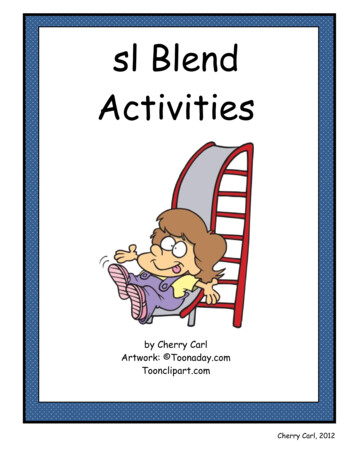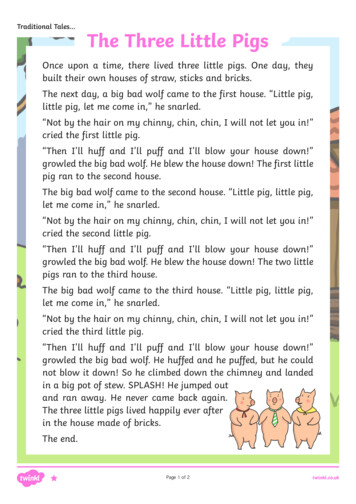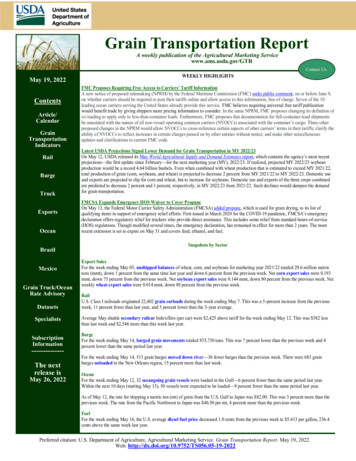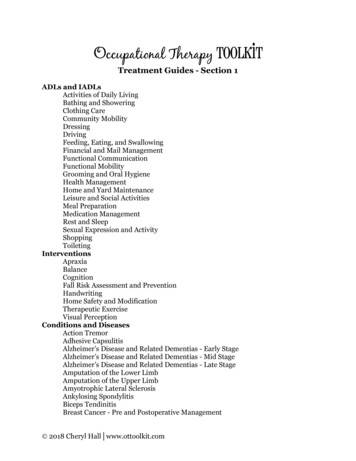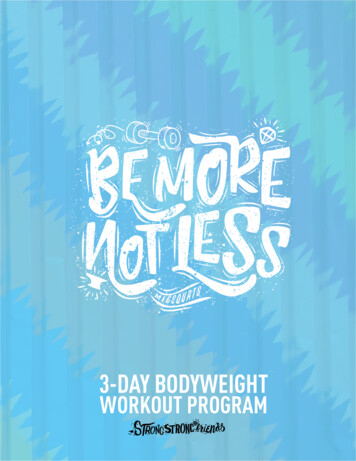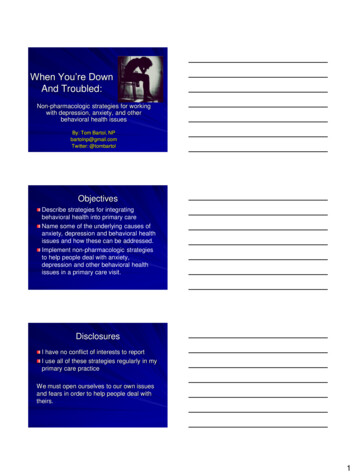
Transcription
When You’re DownAnd Troubled:Non-pharmacologic strategies for workingwith depression, anxiety, and otherbehavioral health issuesBy: Tom Bartol, NPbartolnp@gmail.comTwitter: @tombartolObjectivesDescribe strategies for integratingbehavioral health into primary careName some of the underlying causes ofanxiety, depression and behavioral healthissues and how these can be addressed.Implement non-pharmacologic strategiesto help people deal with anxiety,depression and other behavioral healthissues in a primary care visit.DisclosuresI have no conflict of interests to reportI use all of these strategies regularly in myprimary care practiceWe must open ourselves to our own issuesand fears in order to help people deal withtheirs.1
What about pharmacologicagents?There are a lot of great medications outthere but too many are used too oftenPharmacologic agents are not a substitutefor these non-pharmacologic strategies.They may be an adjunctCase Study61 y/o female with facial swelling x 1 day.Has dental abscessSon is a drug addict, in prison. She paidfor treatment but he didn’t complete it. Hehas young children. Thinks the kids momis addict as well.Father has Alzheimer's and family has eencaring or him at home. Stressful.Case Study48 y/o male, DM & HTN. A1c up from6.9% 3 months ago to 8.2%.Stress with pre-teen daughter, she isdepressed and borderline suicidal.He is stress eating2
Case Study46 y/o male with HTN, ObesityOn 5 antihypertensives and b/p still 160/98Exercises and keeps active but doesn’tlose weightAfter 5 years of treating him, referrals forb/p control (more medications), I askedabout his childhood, “It was good.”IntegratingBehavioral Health(BH)Many people do not come in with BHcomplaints, though many have BH issuesHow can we “assess” BH issues?Likely over 60% of people we see haveBH issues that affect their healthMany people are longing for someone toshare with if given the opportunityIntegrating BH is not a separate person orclinician but what WE doHow do we integrate behavioralhealth care into life?Usually only those who are “sick” enlist thehealth care servicesWe often don’t see our struggles in life asbeing “sick”We even more often we don’t seeourselves as having depression or anxietyUniversal health care means reaching outin new ways, new models to reach peoplethat are “healthy”3
The ContinuumWe all have elements psychopathology– ADHD– Anxiety– DepressionThe degree might vary day to day,experience to experienceIt is possible to fully function with these ifwe know how to cope with themEngaging PatientsAsk, “What matters to you?” as well as“What is the matter?”Getting beyond blood pressure, glucose,and cholesterol to what matters most tothe patientFrom telling the patient what is wrong andtelling what to do, to listening for thepatient to tell us what is wrong andexploring with the patient what to doAcknowledge—pain, sadness, grief, fearas well as joy and challengesQuestions that EngageWhat could be better?Tell me your storyWhat’s the hardest thing for you right now indealing with your (diabetes or any condition)?If you could change one thing in your life rightnow, what would you change?How was your childhood? integrating behavioral health into primary care!4
Be kindfor everyone you meetis fighting a hard battleUnderlying causes “Everyone is seeking to feelgood and avoid pain”The Dalai LlamaEveryone is seeking:ConnectionPurposeHopeWithout these, we don’t thrive,our capacity for health isdiminished5
Past Experiences Affect UsChildhoodRelationshipsAbuseTraumaTragedyFearFear & Worry Lead to:AnxietyAngerImpatienceDecreased self-esteemLess efficient functioningDepleted self controlOvereating, addiction, antisocial behaviorThe opposite of love is, not hate, but fearWe all Want to BE LikedLiked on FacebookHave our tweets re-tweetedHave people view our YouTubeAnd to feel like those around us like usWe do what we can to feel likedMoral Psychology: “We are obsessivelyconcerned about what others think of us,although much of that concern isunconscious and invisible to us.”Jonathon Haidt: The Righteous Mind6
Adequacy TheoryEveryone wants to feel adequateOur culture’s default is to point outinadequacyRepeated words of inadequacy lead tofeelings of inadequacyInadequacy comes from comparingFeelings of FailureFailure can lead to:– Withdrawal– GrowthHow Can We Respond:“A Bridge Over Troubled Waters”7
Treatment ConceptsListenAcknowledge: past and experiencesAffirm: who the patient is, what has beenaccomplished in lifeBelieve in the patients and help them tobelieve in themselvesBuild adequacyShare tools and strategies to use to copeand growMoral psychologyThe first principle of moral psychology is:Intuitions come first, strategic reasoningsecond.Confirmation Bias: The tendency to seekout and interpret new evidence in waysthat confirm what you already think.We expect things to happen the way ourheart or emotion has told us they willhappenComponents of BehaviorThe Rider (Rational)– Analytical– Planner– Problem SolverThe Elephant(Emotional)– Impulsive/Instantgratification– Irrational– Automatic, “gut”responseThe Path (Environment)Jonathan Haidt, The Happiness Hypothesis8
5 Motivations of Human BehaviorTo be acceptedTo belongTo influence (have purpose)To protect ourselves against being hurtTo find intimacyThis is what our patients want, what they arelooking for in life.Building a Relationship of HopeBelieve in othersSuspend negative judgementListen and acknowledge, rather than trying tosolve the problemAffirm them for who they areThis will do more healing than any medicationor treatment we have!PerspectiveWoman without her man is helpless9
PerspectiveWoman, without her man, is helplessPerspectiveWoman, without her, man is helplessPerspectives:Depression and AnxietyThe result of a very narrow or limited viewor perspective of the situationBased on past experiences not futurehopesBased on fears and inadequaciesPerspectives are reality for each personWe can’t change what happens, only ourperspective of it, our attitude, how wechoose to see it10
Changing PerspectivesWe don’t have to internalize what otherssay to usWhat others say to/about us is often theirissue, their projection or insecurityFind compassion for those who say thingsthat may hurt and try not to justify,rationalize, defend, blame or compareChanging ThinkingOur thoughts create our reality. Practicepositive thoughtsGratitude/AppreciationVision what you want and the cognitiveunconscious will take overSee challenges as “opportunities” to growEmbrace your failuresBelieve that the universe has good in storefor youWe Create Our Own RealityWhat is happening to me right now is thebest thing that could be happening.– It may not be easy– It can bring what I need if I let itOur thoughts become a vortex and createmore of what we thinkThe more we think and speak positive, themore positive will happen around usOur words are our world11
Practice AppreciationSharing appreciation for others helps usfeel better about ourselvesMore than a “thank you,” say to someonesomething you appreciate they didStart at check-out from the clinic todayDealing with Past TraumasFear of being hurt, always protecting selfMessages of self-blameMessages of inadequacy“You are an amazing person!”Beyond blame to acknowledgingAffirm the good and gifts that havehappenedRecognize TriggersRelationships/ConflictDo you want to be “right” or solve theproblem?“Help me to understand what you aresaying.”Compassion is an openness to otherperspectivesIt’s not the “what” but the “why” of themessageChoose compassion over blaming12
Responding to ConflictListen to Understand (not to respond)Hear the other’s perspective and acknowledgeDon’t justify, rationalize, compare, defend orblameConflict needs 2 sides, you can control oneLeave the other a way outRespond to the “why” not the “what” of astatementLeave room for dialogueResentmentResentment must be repeated again andagain, it takes a lot of energyResentment does not help the resented orthe resenterForgiveness need be done onceForgiveness helps heal resentment. in usas well as the one we are forgivingFundamental Attribution ErrorWhen someone else does somethingwrong, it is because of who they are– “Non-compliant”– LazyWhen we do something wrong, it isbecause of what is happening around us– External circumstances caused it– What others didIt is an ego protection mechanism13
The Victim SyndromeEveryone else is responsible for theunhappiness– Blaming– Criticizing– Negativity– Doesn’t trustLogic won’t work, listen, don’t solveWe can’t change the victim, only ourresponse.Respond with compassion, as to adisabilityMeditationorMedicationBeginner Meditation TipsStart with 2 minutes daily (set a timer oruse an app)Sit in a comfortable, relaxed positionBreathe through the nose, focus on thebreath moving in and out of the nostrilsIf your mind wanders, acknowledge andreturn to the breath each return to thebreath is part of the exerciseAfter 2 minutes, finish, don’t judge it14
Looking at your MeditationSay, “I did it and it is good.”Success is doing itBe kind and patient, viewing your mindwandering as an opportunity to practiceawareness and redirecting your attention.Notice the infusion of calm, in the moment.Recommend MeditationTry it before you recommend it havesome experience with it yourselfThe key is how you approach it.Ask, “Have you ever done meditation?”Listen to the response, acknowledgesomething said to you, and offer anopportunity to learn.Announce that your are Happy!“It is a modern tragedy that despair has so manyspokesmen, and hope so few.” Oscar Hammerstien IIFind and share enjoyment in your work/life– It doesn’t mean we won’t experience setbacks,disappointment, sadness or pain– Amidst challenges are many more positive things.– On what do you choose to focus?Embrace imperfections, see them asopportunities rather than as faultsEmbrace the moment15
Some simple strategies:Write down 2 things you are thankful foreach dayJournal and re-read it in a month, a yearDon’t defend, blame, justify, rationalize orcompareHear what is said, acknowledge it, even ifyou don’t agreeVision what you want and allow thecognitive unconscious to take overWe’ve been wrong about what ourjob is in medicine. We think or jobis to ensure health andsurvival. But really it is larger thanthat. It is to enable well-being.Atul Gawande fromBeing MortalTake Home PointsListen with your heart. The greatest giftwe can give is to listen and hear anotherAcknowledge and affirm (that is being“liked”)Work on the “why” not the “what” (theelephant not the rider)Everyone deserves to be happy and lovedDaily GratitudeNurture yourself16
Your thoughts andquestions Tom Bartol, NPbartolnp@gmail.comTwitter: @tombartolWe’ve been wrong about what our job is inmedicine. We think or job is to ensurehealth and survival. But really it is largerthan that. It is to enable well-being. Andwell-being is about the reasons one wishesto be alive. Those reasons matter not just atthe end of life, or when disability comes, butall along the way.Atul Gawande fromBeing Mortal17
Jonathan Haidt, The Happiness Hypothesis . 9 5 Motivations of Human Behavior To be accepted To belong To influence (have purpose) To protect ourselves against being hurt To find intimacy This is what our patients want, what they are looking for in life. Building a Relationship of Hope
